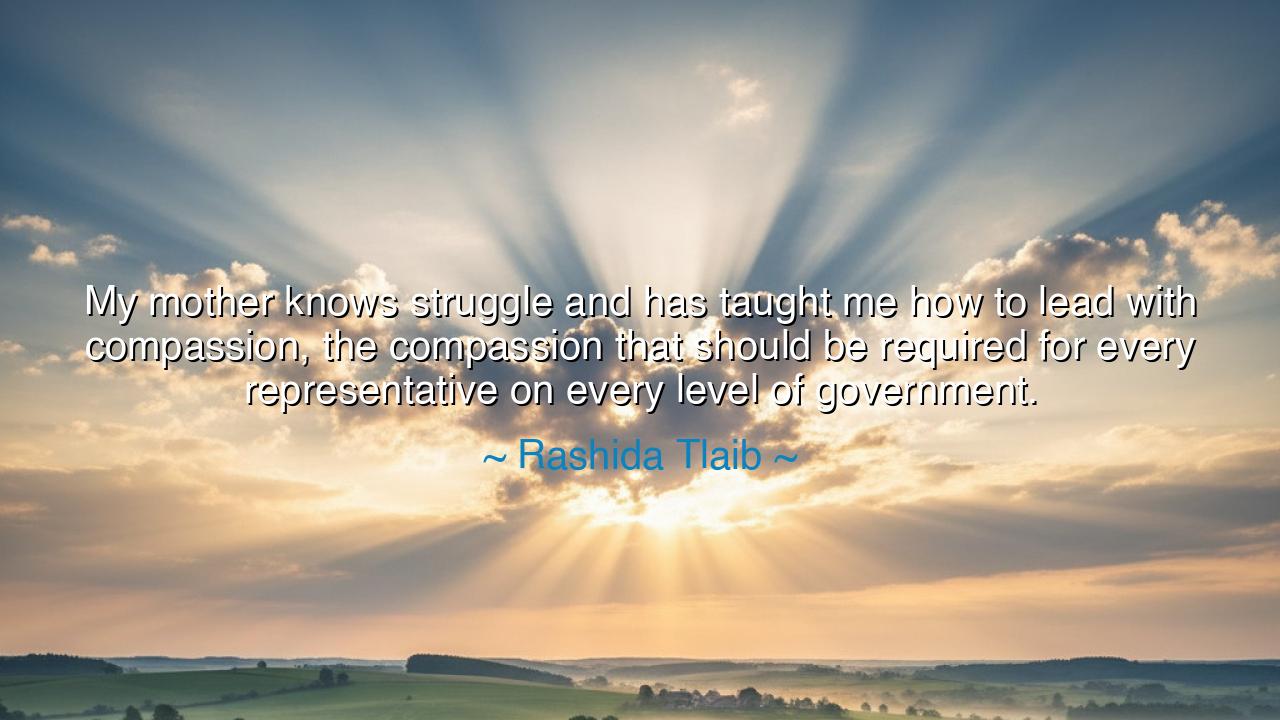
My mother knows struggle and has taught me how to lead with
My mother knows struggle and has taught me how to lead with compassion, the compassion that should be required for every representative on every level of government.






In the voice of gratitude and strength, Rashida Tlaib, a daughter of immigrants and a servant of the people, once spoke these luminous words: “My mother knows struggle and has taught me how to lead with compassion, the compassion that should be required for every representative on every level of government.” Her words rise like a hymn to the dignity of labor, to the holiness of endurance, and to the sacred union between struggle and compassion. For in her mother’s life—shaped by hardship, by perseverance, by the quiet heroism of the unseen—Tlaib discovered the truest form of leadership: not power over others, but care for them. This is no mere sentiment; it is an ancient principle, as old as humanity itself, that those who suffer with the people are the ones most fit to serve them.
To understand the depth of this saying, one must first behold what struggle truly is. It is not simply the burden of toil or the pain of adversity—it is the crucible through which the soul is purified, the fire that tempers the heart into wisdom. Tlaib speaks of her mother, who, like countless women before her, bore hardship not for glory, but for survival. Through poverty, labor, and sacrifice, she learned compassion not from books or councils, but from life itself. Such compassion is not soft or sentimental; it is forged in the heat of endurance. It is the compassion that sees hunger and remembers its taste, that beholds injustice and feels the sting of its wound.
This is why Rashida Tlaib says that compassion must be “required for every representative.” For without it, government becomes a machine without soul—a body without breath, a law without mercy. The ancients knew this well. In the writings of Confucius, it was taught that the ruler who governs without benevolence invites rebellion, while the ruler who governs with empathy brings harmony to the realm. Likewise, the philosopher Marcus Aurelius, emperor of Rome, spoke of the duty to understand the pain of one’s subjects, saying, “The best revenge is to be unlike him who performed the injury.” Compassion, then, is not weakness—it is strength refined by wisdom, the mark of one who can hold power without being consumed by it.
History offers its own testament. In the bleak days of the Great Depression, when millions of Americans wandered jobless and hungry, it was Eleanor Roosevelt—a woman who knew both privilege and pain—who walked among the destitute, who listened, who wept, and who reminded her husband, President Roosevelt, that policies without compassion were as hollow as promises without deeds. She, like Tlaib’s mother, embodied the truth that those who have felt the ache of struggle are those most fit to heal it. It is no accident that leaders who rise from hardship—whether a peasant who becomes a president or a child of immigrants who enters Congress—carry within them a flame that the comfortable often forget: the flame of empathy, which lights the way toward justice.
Yet Tlaib’s words are not only a tribute to her mother—they are a rebuke to the age in which we live. In a world often governed by ambition, by profit, and by pride, she reminds us that the true qualification for leadership is not wealth, nor intellect, nor lineage, but compassion born of struggle. The ruler who has never known hardship cannot truly serve those who live within it. To lead well is to remember pain, to feel what others feel, and to act not for self, but for the greater good. It is to see in every citizen the reflection of one’s own mother, father, or child—and to govern as one would protect them.
From this teaching, let every person—whether ruler or citizen—learn their duty. For though not all may hold office, all can lead with compassion. The mother who teaches, the worker who helps his neighbor, the student who defends the weak—all practice the same sacred art. Compassion is not the privilege of saints or officials; it is the birthright of all who have hearts that remember pain. It is the seed from which every act of justice and every bond of community grows.
So, my children of the world, hear the wisdom of Rashida Tlaib and the spirit of her mother: let your struggles become your teachers, and your compassion your strength. If you rise to power, let humility temper you; if you live in hardship, let empathy guide you. For the measure of a leader—and indeed, of a human being—is not how high they climb, but how deeply they care. And when compassion rules the hearts of those who govern, then government itself becomes not an instrument of domination, but an expression of love—a love that, born of struggle, binds all people together in shared dignity and peace.






AAdministratorAdministrator
Welcome, honored guests. Please leave a comment, we will respond soon